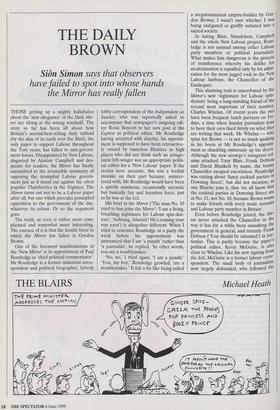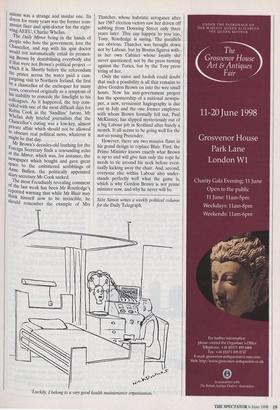THE DAILY BROWN
SiOn Simon says that observers
have failed to spot into whose hands the Mirror has really fallen
THOSE getting up a mighty hullabaloo about the 'new allegiance' of the Daily Mir- ror are tilting at the wrong windmill. The story so far has been all about how Britain's second-best-selling daily tabloid (by the skin of its teeth over the Mail), the only paper to support Labour throughout the Tory years, has fallen to anti-govern- ment forces. Disappointed by New Labour, disgusted by Alastair Campbell and des- perate for readers, the Mirror has finally succumbed to the irresistible symmetry of opposing the triumphal Labour govern- ment just as it stood out against the often popular Thatcherites in the Eighties. The Mirror turns out not to be a Labour paper after all, but one which provides principled opposition to the government of the day, whatever its colour. Or so the argument goes.
The truth, as ever, is rather more com- plicated and somewhat more interesting. The essence of it is that the hostile force to which the Mirror has fallen is Gordon Brown.
One of the foremost manifestations of the 'New Mirror' is its appointment of Paul Routledge as 'chief political commentator'. Mr Routledge is a former industrial corre- spondent and political biographer, latterly lobby correspondent of the Independent on Sunday, who was reportedly asked to accompany that newspaper's outgoing edi- tor Rosie Boycott to her new post at the Express as political editor. Mr Routledge having accepted with alacrity, his appoint- ment is supposed to have been retroactive- ly vetoed by nameless Blairites in high places who did not think such an antago- nistic left-winger was an appropriate politi- cal editor for a 'New Labour' paper. If the stories were accurate, this was a foolish mistake on their part because, uninter- fered with, Mr Routledge would have been a quietly assiduous, occasionally sarcastic but basically fair and harmless force, just as he was at the /oS.
His brief at the Mirror (`The man No. 10 tried to ban joins the Mirror'; 'I am a living, breathing nightmare for Labour spin-doc- tors'; 'Achtung, Alastair! He's coming your way soon') is altogether different. When I tried to convince Routledge at a party the week before his appointment was announced that I am 'a pundit' rather than 'a journalist', he replied, 'In other words, you are a troublemaker.'
'No, no,' I tried again, 'I am a pundit.' 'You, my boy,' Routledge growled, 'are a troublemaker.' It felt a bit like being called a megalomaniacal empire-builder by Gor- don Brown; I wasn't sure whether I was being castigated or gruffly initiated into a sacred society. In hating Blair, Mandelson, Campbell and the whole New Labour project, Rout- ledge is not unusual among either Labour party members or political journalists, What makes him dangerous is the process of transference whereby his dislike for modernisation is equalled only by his admi- ration for the most jagged rock in the New Labour harbour, the Chancellor of the Exchequer.
This alarming trait is exacerbated by the Mirror's new 'nightmare for Labour spin' doctors' being a long-standing friend of the second most important of their number, Charles Whelan. Of recent years the two have been frequent lunch partners on Fri- days, a time when Sunday journalists tend to have their eyes fixed firmly on what they are writing that week. Mr Whelan — who spins for Brown — is not so much quaking in his boots at Mr Routledge's appoint- ment as chuckling ominously up his sleeve. Although the new scourge's inaugural col- umn attacked Tony Blair, Frank Dobson and David Blunkett by name, the bonny Chancellor escaped excoriation. Routledge was cutting about 'fancy cocktail parties in Downing Street', but did not mention, as one Blairite puts it, that 'we all know that the cocktail parties in Downing Street are at No. 11, not No. 10, because Brown wants to make friends with every trade unionist and Labour party member in Britain'. , Even before Routledge joined, the Mir- ror never attacked the Chancellor in the way it has for a while been assaulting the government in general, and recently Frank Dobson (`You should be ashamed') in par- ticular. This is partly because the paper political editor, Kevin McGuire, is also close to Whelan. Like his new signing troll' the /oS, McGuire is a former labour corre- spondent. The small body of journalists, now largely disbanded, who followed the unions was a strange and insular one. Its doyen for many years was the former com- munist fixer and spin-doctor for the right- Wing AEEU, Charlie Whelan. The Daily Mirror being in the hands of People who hate the government, love the Chancellor, and sup with his spin doctor would not automatically entail its promot- ing Brown by destabilising everybody else if that were not Brown's political project — Which it is. Shortly before the referendum the prince across the water paid a cam- paigning visit to Northern Ireland, the first by a chancellor of the exchequer for many Years, conceived originally as a symptom of his inability to concede the limelight to his colleagues. As it happened, the trip coin- cided with one of the most difficult days for Robin Cook in the 'Sandline' furore. Mr Whelan duly briefed journalists that the Chancellor's outing was a low-key, almost private affair which should not be allowed to obscure real political news, whatever it might be that day. Mr Brown's decades-old loathing for the Foreign Secretary finds a resounding echo at the Mirror, which was, for instance, the newspaper which bought and gave great space to the embittered scribblings of A.nne Bullen, the politically appointed diary secretary Mr Cook sacked. The most Freudianly revealing comment Of the last week has been Mr Routledge's reported warning that while Mr Blair may think himself now to be invincible, he should remember the example of Mrs Thatcher, whose hubristic arrogance after her 1987 election victory saw her driven off sobbing from Downing Street only three years later. This can happen to you too, Tony, Routledge is saying. The parallels are obvious. Thatcher was brought down not by Labour, but by Brutus figures with- in her own Cabinet whose loyalty she never questioned; not by the press turning against the Tories, but by the Tory press tiring of her.
Only the naive and foolish could doubt that such a possibility is all that remains to drive Gordon Brown on into the wee small hours. Now his anti-government project has the sponsorship of a national newspa- per, a new, revisionist hagiography is due out in July and the one former employee with whom Brown formally fell out, Paul McKinney, has slipped mysteriously out of a big Labour job in Scotland after barely a month. It all seems to be going well for the not-so-young Pretender.
However, there are two massive flaws in his grand design to replace Blair. First, the Prime Minister knows exactly what Brown is up to and will give him only the rope he needs to tie around his neck before even- tually kicking away the chair. And, second, everyone else within Labour also under- stands perfectly well what the game is, which is why Gordon Brown is not prime minister now, and why he never will be.
Si6n Simon writes a weekly political column for the Daily Telegraph.
'Luckily, I belong to a very good health maintenance organisation.'



























































 Previous page
Previous page